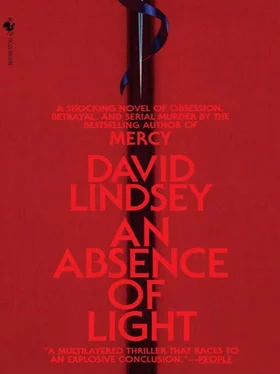David Lindsey - An Absence of Light
Здесь есть возможность читать онлайн «David Lindsey - An Absence of Light» весь текст электронной книги совершенно бесплатно (целиком полную версию без сокращений). В некоторых случаях можно слушать аудио, скачать через торрент в формате fb2 и присутствует краткое содержание. Жанр: Полицейский детектив, на английском языке. Описание произведения, (предисловие) а так же отзывы посетителей доступны на портале библиотеки ЛибКат.
- Название:An Absence of Light
- Автор:
- Жанр:
- Год:неизвестен
- ISBN:нет данных
- Рейтинг книги:5 / 5. Голосов: 1
-
Избранное:Добавить в избранное
- Отзывы:
-
Ваша оценка:
- 100
- 1
- 2
- 3
- 4
- 5
An Absence of Light: краткое содержание, описание и аннотация
Предлагаем к чтению аннотацию, описание, краткое содержание или предисловие (зависит от того, что написал сам автор книги «An Absence of Light»). Если вы не нашли необходимую информацию о книге — напишите в комментариях, мы постараемся отыскать её.
An Absence of Light — читать онлайн бесплатно полную книгу (весь текст) целиком
Ниже представлен текст книги, разбитый по страницам. Система сохранения места последней прочитанной страницы, позволяет с удобством читать онлайн бесплатно книгу «An Absence of Light», без необходимости каждый раз заново искать на чём Вы остановились. Поставьте закладку, и сможете в любой момент перейти на страницу, на которой закончили чтение.
Интервал:
Закладка:
Graver felt a momentary optimism. Then maybe it was suicide.
“By the way, you had some good luck,” Tordella said.
Graver pulled his eyes away from the bag and looked at the stubby detective. “What.”
“I wasn’t first out,” Tordella said. “Not ten minutes before this call came in there was a shoot-out at a convenience store out in Kashmere Gardens. The clerk at the store shot a couple of guys who tried to rob him. Killed one on the spot. Wounded the other one who then killed the clerk and ran off, shooting every which way and wounding a woman outside. Right now he’s holed up in a garage apartment about a block from the store-with a hostage. Caused a lot of radio action. Everybody in the pressroom headed out there, and by now I imagine all their cruise cars are either there or headed there.”
Somebody swore sharply with a hiss, and Graver and Tordella looked over to Tisler’s car where a man in street clothes, maybe the coroner’s investigator, was walking away from the opened car door, stamping his foot and wiping it on the grass. He swore again.
“Anyway,” Tordella said, turning back to Graver, “Then this came in. The kid over there who called it in” — he looked in the direction of one of the young uniformed officers-”thought he was a detective and said over the radio that he had a ‘suicide.’ If anybody was listening, I imagine it was a pretty dull prospect compared to the Kashmere show. I don’t think anybody in the media even knows we’re out here.”
“Yeah,” Graver said, “that’s a break, a good break.” He looked toward Tisler’s car again.
“He was an investigator, wasn’t he?” Tordella asked.
“Yeah.”
“Was he working tonight?”
“Jesus, I wish I knew,” Graver said.
Tordella nodded. His large, dark eyes were heavy and, despite his anxiety, lent an air of calm to his demeanor. “What squad?”
“Organized Crime.” Graver knew how that must have sounded, replete with implication.
Tordella nodded again, meditatively. “IAD guys are on their way out,” he said.
Internal Affairs automatically made every officer-related shooting. This was going to give Jack Westrate a heart attack.
“And Captain Katz is on the way too,” Tordella added. He was referring to Herb Katz, Graver’s counterpart in Homicide. “Lieutenant had already gone out to Kashmere Gardens,” Tordella explained.
That was irrelevant, Katz would have been called anyway. And Katz probably already had called Jack Westrate who, as assistant chief in charge of Investigative Services, was Graver’s and Katz’s superior. But Westrate wouldn’t be appearing in the dark, weedy field. His domain of concern was the gassy, background realm of ramifications and politics, not events. He would be frantic about this, of course, he even would be in a state of panic, but for all the wrong reasons.
“What do you think?” Graver asked finally. He wanted a measure of Tordella’s gut reaction. He wanted the experienced detective’s feel for the scene.
“Well, I’ve been here only a little while myself,” he said pointedly, shaking his head, “but not knowing anything else about it, just looking at it, I’d lean toward suicide.”
Graver was relieved, but only momentarily. Still, at this point, even a temporary reprieve was welcome. They didn’t say anything for a minute, watching the woman from the Crime Scene Unit as she videotaped the car and its contents, working it from every conceivable angle and perspective. When she was finished, Graver felt the detective looking at him. Taking his eyes off the car, he looked around. Tordella’s sagging eyes were emotionless, his mouth slightly puckered on one side as he worked at the ends of his mustache.
“Okay, let’s take a look,” Graver said.
Tordella ducked his head, and they started toward Tisler’s car. Though there hadn’t been enough rain to create mud, it was damp enough to cause the soil to cake to Graver’s shoes. Tordella stopped him behind the yellow ribbon that had been stretched on the ground in front of the open car door and was held in place by a couple of sticks jabbed into the dirt.
“We’re still looking for something over there,” he said, gesturing vaguely toward the other side of the ribbon.
In the headlight beams of the patrol unit, Graver could see Tisler’s leg under the steering wheel, slanting awkwardly with his foot out the open door, his body slumped into the darkness toward the passenger seat. The beams backlighted the window of the open door on the driver’s side, setting aglow the rusty splatter on the glass, the particulate matter that had been part of the contents of Tisler’s head.
Buttoning his suit coat so the tails wouldn’t be in the way, Graver stepped over the yellow ribbon and walked up to the door, careful about the grass at his feet He put his hands in his pockets, set his jaw, and looked inside.
Tisler had been sitting behind the steering wheel when the shot was fired, but his upper body was now laying over on the passenger side, his blasted head partially submerged in the black syrup that had pooled in the depression of the seat His right leg was twisted awkwardly under the steering wheel column, his left one stretched full-length, sticking out the door. His right arm was flung out, hanging over the edge of the seat, and under it on the floor was a handgun, an automatic. There was a world of blood, and Graver could smell it, an oddly precise odor, a kind of musty sweetness, like something that had been stored in a dank cellar, something old. It was, he thought, an odor that probably had not changed in all the millennia of human history, that surely had smelled exactly like this ever since the day that Cain became the first man to breathe it.
Tordella pointed at the inside of the doorjamb, at the button that allowed the light to come on when the door was opened.
“He wedged a wooden match next to the button to keep it pushed in,” he said. “I guess maybe he sat here a while before he did it and didn’t want to attract attention.” He gestured toward the dashboard. “Radio’s on, but the volume’s turned down. You wonder why he didn’t just turn it off.”
“And the door was open like this?”
“Yeah, just like this. And look.” Tordella leaned across in front of Graver and pointed to the edge of the open door. “I think the damned bullet nicked the door frame. That’s what we’re looking for in the grass there, the slug.”
“There’s no note?”
“We haven’t found one”-Tordella shrugged, nibbling at his mustache-”but we haven’t gone through all of his clothes yet, or the car.”
He shone his flashlight around inside the car. A pair of trousers on a coat hanger covered with clear plastic was hanging behind the passenger’s side in the back; a pink laundry slip was stapled to the plastic. There was nothing else in the back seat, no litter, no clutter, no overlooked gum wrappers.
“Was he a neat person, like this?” Tordella nodded at the back seat.
“He was neat,” Graver said.
“Somebody might’ve cleaned it up. Or I guess he might’ve. You know, the way they do sometimes.”
There were a lot of myths about suicides, about how they often carefully planned their deaths, about their oddly scrupulous behavior before they died, about the strange logic of their dementia. But Graver never had been impressed by any of that. He did not find such generalities particularly convincing because he did not think of suicides as a single, peculiar species with specific, identifiable characteristics. Mentally disturbed people committed suicide. Intelligent, well-balanced people committed suicide. Cowards committed suicide and heroes too. Richard Cory killed himself, as did Judas. And Socrates. Graver saw very little in such a diversity that lent itself to generalization. He was invariably suspicious of simple, formulaic explanations to anything; axioms made him uneasy.
Читать дальшеИнтервал:
Закладка:
Похожие книги на «An Absence of Light»
Представляем Вашему вниманию похожие книги на «An Absence of Light» списком для выбора. Мы отобрали схожую по названию и смыслу литературу в надежде предоставить читателям больше вариантов отыскать новые, интересные, ещё непрочитанные произведения.
Обсуждение, отзывы о книге «An Absence of Light» и просто собственные мнения читателей. Оставьте ваши комментарии, напишите, что Вы думаете о произведении, его смысле или главных героях. Укажите что конкретно понравилось, а что нет, и почему Вы так считаете.












